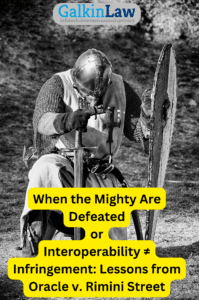
The recent December 16, 2024, decision by the Ninth Circuit Court of Appeals in Oracle v. Rimini Street sheds light on the nuanced application of copyright law to technology. The core issue revolved around whether interoperability between software systems constitutes copyright infringement. This case underscores that understanding the underlying technology is critical for applying copyright law.
🔧 The Technology at Issue
Oracle, a major developer of enterprise software, alleged that Rimini Street, a third-party provider of software support, violated Oracle’s copyrights by using its software to service clients. Rimini’s processes involved creating software files and updates that were interoperable with Oracle’s programs, such as PeopleSoft. These updates allowed clients to use Oracle’s software effectively without relying directly on Oracle for support.
⚖️ Lower Court’s Holding
The District Court ruled in favor of Oracle, finding that Rimini infringed Oracle’s copyrights in multiple ways:
- Creation of Derivative Works: The court deemed works infringing solely because they interoperated exclusively with Oracle’s programs.
- Licensing Violations: Rimini created multiple copies of Oracle environments for its clients, breaching licensing terms.
- Defense Rejection: The court dismissed Rimini’s argument under 17 U.S.C. § 117(a), which allows owners of software copies to create additional copies as an essential step in using the software.
The District Court issued a broad permanent injunction requiring Rimini to delete software files and cease certain business practices.
📜 Appeals Court’s Decision
The Ninth Circuit vacated significant portions of the District Court’s ruling, providing a more nuanced perspective on technology and copyright:
- Interoperability ≠ Infringement: Interoperability alone does not create a derivative work. A derivative work must substantially incorporate copyrighted material, either literally or nonliterally.
- Licensing Agreements Under Scrutiny: The court questioned whether Oracle’s customers “owned” copies of the software under § 117(a), noting ownership depends on factors beyond licensing labels.
- Reevaluation of Processes: The court vacated findings related to Rimini’s automated tools and PeopleSoft updates, directing the District Court to reassess whether they incorporated Oracle’s protected elements.
🔑 Key Holding on Interoperability
Both courts addressed whether interoperability inherently constitutes copyright infringement. The Ninth Circuit clarified that while interoperability facilitates systems working together, it does not amount to infringement unless copyrighted material is substantially copied or incorporated.
💡 Practice Tips for Tech Businesses
- Understand Licensing Agreements: Review software licenses closely to clarify rights and restrictions, especially around third-party use.
- Document Development Processes: Maintain thorough records proving proprietary elements were not copied.
- Assess Ownership Rights: If relying on § 117(a), evaluate whether users can claim ownership of software copies under licensing terms.
- Avoid Overbroad Claims: Interoperability alone is insufficient to prove infringement; focus on concrete evidence of copying.
- Stay Updated on Legal Standards: Legal interpretations are evolving with technology. Monitor relevant court decisions like this one.
This decision highlights the balance between copyright protections and fostering technological innovation. The Ninth Circuit’s emphasis on substantial copying sets a precedent that mere interoperability does not amount to infringement.
#CopyrightLaw #Interoperability #SoftwareSupport #OraclevRimini #TechLegalInsights
